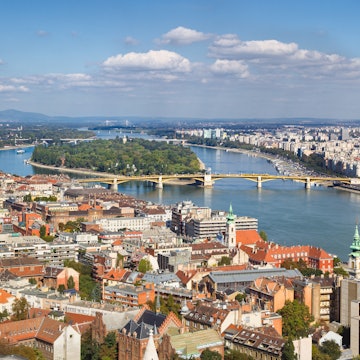

A lookout terrace restaurant at Fisherman's Bastion in Budapest. Luis Dafos/Getty Images
Budapest’s elegant boulevards and world-famous thermal baths welcome visitors from around the globe. But even seasoned travelers can find themselves confused by some aspects of navigating the city.
An otherwise wonderful trip could be marred if you get a fine for failing to validate your public transportation ticket correctly. And you'll want to avoid being taken for a ride – literally – by an unscrupulous taxi driver. Unfortunately, there's also the recurring story of male visitors getting scammed by pretty women at shady bars...
That said, the Hungarian capital is generally a safe place for visitors, and you can easily avoid these scenarios with a little planning and by following our list of things to do – and things to avoid – when visiting Budapest.
1. Pack comfortable walking shoes (but not sneakers)
Since Budapest is a highly walkable city, you’re going to be on your feet all day. Pack shoes that you’ll be comfortable wearing for hours while you’re out exploring – while keeping in mind that sneakers will likely single you out as a tourist.
2. Bring an umbrella
It’s a good idea to bring an umbrella to Budapest, even in the summer. The city can experience sudden heavy downpours, especially in the warmer months.
3. Bring forints, not euros
Though Hungary uses the forint as its currency, some hotels, restaurants and shops will accept euros, giving change back in forints. Since establishments can be reluctant to accept large bills (like 20,000Ft notes), withdraw smaller bills from ATMs when possible.
4. Avoid Euronet ATMs
You’ll see Euronet ATMs all around town, especially in bars, but they charge exorbitant bank fees. The convenience is not worth the cost.

5. Pack for the pool
Soaking in Budapest’s thermal baths is one of the city’s most treasured experiences, so pack your stuff for swimming, including a pair of flip-flops or pool sandals and a beach towel. You can rent a towel if you prefer not to bulk out your bags, but be prepared to pay as much as 5000Ft (about US$14).
6. Book tickets in advance for popular museums
If you’re visiting Budapest during peak season (in summer or around Christmas), or you have your heart set on seeing a seasonal exhibition, you can skip the long lines by booking tickets in advance. Some popular sites have caps on attendance, so it pays to plan ahead and ensure you can visit what you want to. If you buy a ticket before you arrive, download it to your phone, show the QR code and walk right in without waiting.
7. Download taxi and transport apps
To navigate the city on the go, download the BKK (Budapesti Közlekedési Központ) app, issued by the city’s official public transport agency, or CityMapper. For taxis, get a taxi app like Bolt. Note that Uber is no longer available in Hungary.
8. Never hail a taxi
Flagging taxis on the street is risky because some rogue operators rip visitors off by driving around the city or using other tricks. This has been happening less and less in recent years, but it’s still better to call a cab or use an app to order one.

9. Validate your public transport ticket
The ticketing system for Budapest’s public transport can be confusing for first-time riders. The most important thing to remember is that you must buy a ticket before getting on public transport, validate it when boarding and keep it until the end of your journey. Most tram and metro stops have machines where you can purchase tickets; on the bus, you can buy them from the driver. Check that your ticket has a date, time stamp or punched holes – these mean it’s validated and that you’re good to go. Otherwise, you risk getting caught by a roving ticket inspector and being charged a hefty fine.
10. Learn how to board the bus
Most of the time, you can get on the bus in Budapest through any door, and there’s no need to show your ticket to the driver. If you have a single ticket, validate it using the onboard machines, and you’re ready to ride. (If you have a pass for a longer duration, keep it on you.) Some buses, however, are front-boarding only. If you notice a bus that opens its front door only to boarding passengers, get in line and have your ticket or pass ready to show the driver.
11. After midnight, take a taxi back to your accommodations
Budapest’s city center (especially District VII) is fairly nocturnal, and the central districts inside the Grand Boulevard are safe after midnight. But if you’re staying in Budapest’s outer neighborhoods – such as Districts VIII or IX, beyond the Grand Boulevard – it’s safest to take a taxi to your accommodations if you’re having a late night.
12. Learn a few words in Hungarian before arriving
Knowing how to say “please” and “thank you” in Hungarian goes a long way with the locals. Before your trip, buy a phrasebook and learn the basics of this idiosyncratic language. One very important tip: make sure you get the accent right on the “é” in egészségedre (“egg-ees-sheeg-ed-re”), and don’t accidentally say egészsegedre (“egg-ess-shegg-ed-re”). The first means “to your health,” but the other is “to your whole ass.”
13. Wear a swimming cap in the bathhouse pools
You can enter the swimming pools at the thermal baths only if you’re wearing a swimming cap. (Many bathhouses sell swimming caps at the ticket office for up to 2000Ft.) This rule does not apply to the thermal baths themselves, only to the on-site swimming pools.
14. Tip at restaurants
Some restaurants include a service charge on the bill, so it’s a good idea to ask if this is included when paying (it usually appears on the bill as szerviz). If not, it’s customary to tip around 10%. Hungarians often round up the bill and tell the server how much they want to pay, including tips (especially if they still need change back). If you give a banknote that’s more than your bill and say “thank you,” your server will likely see that as an invitation to keep the change.
15. Don’t clink your beer glasses with Hungarians
Hungarians don’t say “cheers” with beers – or at least they haven’t for the past 150 years. When Austria's Habsburgs defeated Hungary in the 1848 revolution, Austrians in Vienna celebrated the defeat by toasting and clinking beer steins. As a form of subtle protest, Hungarians vowed never to do the same, and they haven’t raised their beer glasses since. You might notice some of the younger crowd forgoing this rule, so if you’re in the company of Hungarians with beer, follow their lead.
Note that this rule doesn’t apply to drinks like wine or pálinka (a local fruit brandy); Hungarians even consider it rude not to look the other person in the eyes and say “cheers” when raising a glass of anything other than beer.

16. Greet staff when you enter a shop
When you go into a smaller shop, it’s polite to say “Jó napot” (“good day”).
17. Don’t smile too much (Hungarians don’t)
Hungarians are not the smiliest people, and smiling at strangers or while out and about is much less prevalent in Hungarian culture than it is in, say, the United States. Walking around with a big smile on your face at all times will probably make it clear to locals that you’re not one of them. There’s no harm in smiling – but you might just attract a tout trying to sell you a bus tour.
18. Take precautions with your belongings
Pickpockets are common on rush-hour public transport and in touristy areas. Keep your belongings in a safe place, such as a money belt around your waist or a zipped-up compartment inside a bag. Don’t put your wallet or phone in your pocket, as this is the easiest place for a pickpocket to swipe it from.
19. Watch out for the Budapest bar scam
Unfortunately, one of the main risks in visiting Budapest is getting ripped off – and there’s one recurring scam that’s as old as time. Male travelers will often be approached by attractive, friendly young women who invite them to a bar. Once inside, the men get presented with a huge bill, along with threats of calling the police if they don’t pay. The moral of the story? Try to resist tagging along with any women who approach you – or at least avoid any bar they suggest.

20. Be aware of recent LGBTIQ+ laws
Hungary is earning a bad reputation with LGBTIQ+ travelers because of laws that have been enacted over the last few years, such as one making it impossible for trans people to legally change their gender. Another, the so-called “Anti-Pedophile Bill,” draws lamentable parallels between pedophilia and homosexuality and bans LGBTIQ+ representation in media available to people under 18.
The good news is that Budapest is more liberal, especially if you stay around downtown. A vibrant population of progressive activists keeps up the fight for LGBTIQ+ rights in Hungary, and Pride gets bigger every year, with thousands joining in solidarity. You’ll find many places welcoming LGBTIQ+ visitors; Budapest Pride maintains a helpful directory of safe and friendly venues for LGBTIQ+ people.
21. Know how to get medical help if needed
For peace of mind, it’s a good idea to get insurance before traveling. The Hungarian public health system is often understaffed, and it can be hard to find English-speaking doctors or nurses in public hospitals and clinics. Popular private clinics include First Med and Swiss Clinic. If you need a pharmacy, you’ll find them all across the city center, with a few that are open 24/7.














